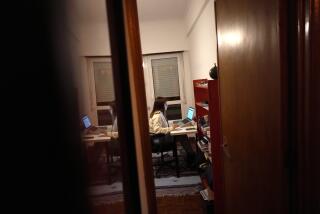Electronic Monitoring and Work Stress
- Share via
Are the 3 million to 5 million computer workers, who are electronically monitored by their supervisors, at higher risk for stress-related job ills such as insomnia and headaches? Researchers sharply disagreed last week at the second International Conference on Work With Visual Display Units in Montreal.
Gary Cwitco of the Communications Workers of Canada found that two-thirds of the 700 Bell Canada operators he surveyed said their monitored jobs were very stressful or moderately stressful. And 70% of the workers told him the perceived preference for speed over quality of service created psychological distress.
“It’s not true to say that evaluative monitored workers are more harmfully stressed,” counters Alan F. Westin, a Columbia University professor of public law and government, basing his conclusion on a six-year study of 200 organizations, 60% of them corporations and 40% governmental or nonprofit organizations.
The key to minimizing work-related computer ills, he found, are good ergonomics--the efficient operation of the physical environment--plus fair practices. In his interviews with 1,800 workers, he found they did not regard monitoring as stressful if three conditions were met:
-- Fair standards: “That means asking employee input in work problems.”
-- Knowledge of monitoring: “Employees must know what kind of monitoring is being done and have access to the information.”
-- Fair treatment: “Everyone must be treated fairly, with no racial or other discrimination.”
If those conditions are met, Westin claims, he found no increase in worker’s compensation claims for VDT-related injuries among monitored workers.
“That kind of ideal setup is rare,” says Karen Nussbaum of 9 to 5, the National Assn. of Working Women, which has received hundreds of calls from disgruntled monitored workers. “Although we realize that monitoring is not inherently stressful, most studies done here (in the United States) do show a correlation between monitored workers and higher rates of stress-related disease.” To answer questions about computer-related stresses, 9 to 5 maintains a job hot line (800) 245-9865.
Healthier Than?
Die-hard runners are often taunted for being healthier-than-thou. Now a new study shows that even they aren’t perfect.
In a study of 947 runners, just published in Public Health Reports, both men and women runners were only a little more likely than a random national sample to adhere to the seven habits associated with longevity. Those habits, established in a study initiated in Alameda County, Calif., in 1965, and therefore dubbed the Alameda 7, are drinking moderately, exercising regularly, maintaining desirable weight for height, eating breakfast, not snacking, sleeping 7-8 hours nightly and never having smoked.
“About half of the runners practiced five or more of these health habits,” says Caroline Macera, a University of South Carolina researcher who co-authored the study. “But about half of the national sample practiced four or more good health habits. So take away the running and the runners are no more healthy than the national sample.
“But they did do better than the national sample on not currently smoking.”
The research mirrors clinical experience, believes Rodney Bassett, an exercise physiologist at Centinela Hospital Fitness Institute, Culver City. Runners, particularly younger runners, are most likely to fall short on adequate sleep and poor diet. “Often,” says Bassett, “they’ll grab anything--even a Big Mac--and figure they’ll run it off later.”
More to Read
Inside the business of entertainment
The Wide Shot brings you news, analysis and insights on everything from streaming wars to production — and what it all means for the future.
You may occasionally receive promotional content from the Los Angeles Times.










